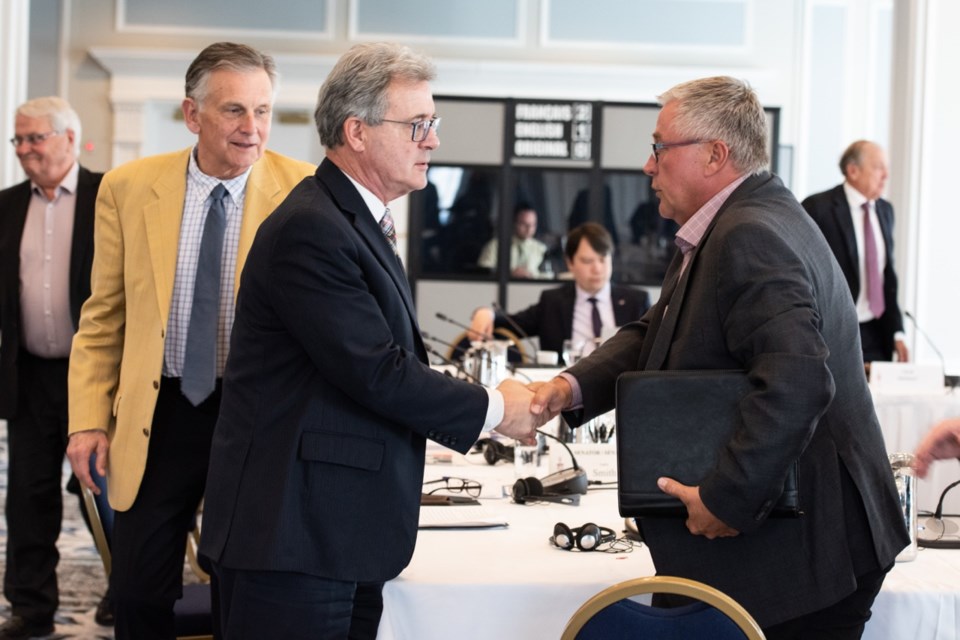The Senate Transportation and Communications Committee got an earful when it held a hearing May 1 in Regina, looking into Bill C-48, the Oil Tanker Moratorium Act.
Nearly all the presentations were dead-set against the bill save one. In a curious juxtaposition, Davide Latremouille, a fisheries habitat biologist originally from the Maritimes, was representing the Skeena Fisheries Commission, whose membership included the hereditary leadership of several First Nations in the Skeena, B.C., watershed.
He was calling for the tanker ban, while Sean Willy, president and chief executive officer of Des Nedhe Developments from Saskatchewan’s English River First Nation, expressed that the ban would be an impediment to northern jobs.
The hearings were set up in panels made up of roughly similar interest groups, with up to four witnesses allotted an hour-long block. The witnesses each had five minutes to make an initial statement, and the rest of the time was made up by the senators asking more in-depth questions into their positions.
Speaking on behalf of the provincial government was Energy and Resources Minister Bronwyn Eyre, who got a half-hour panel to herself.
Eyre said, “This Canadian energy crisis that we are in — because it is a crisis — represents; and is having on people. This crisis continues to put Canadian jobs at risk: thousands across Western Canada.
“And these are Canadian jobs. Just like GM or Chrysler jobs or SNC-Lavalin jobs.
“We like to say that energy jobs are ‘people too.’”
She stressed the double standard of allowing tankers off the East Coast, but banning them from the West Coast.
There was a substantial Estevan contingent, especially after Senator Denise Batters put out a request. Other Saskatchewan legislators made similar urgings for people to come forward.
John Breakey of Estevan-based Fire Sky Energy said, “The message to investors is Canada is not prepared to develop or maintain its economic engines. Canada is not open for business.”
Independent Well Servicing’s Brian Crossman said, “This is not just about the microcosm of a tanker ban on the northwest coast of British Columbia. This is about a much larger picture. Realistically, we are in a carbon-based economy right now and for the foreseeable future.
“The entire world needs reasonably priced, ethically produced, accessible energy to both maintain our Canadian standard of living and to raise the standard of living in the rest of the world. By not allowing Canadians the opportunity to sell our products to the world only allows other, less ethical and less environmentally friendly countries to sell at a higher price to the rest of the world, including Eastern Canada. This ties our hands in the most unfair, unethical way.
“Our own Canadian government allows U.S. based groups to fund activists to protest and block the movement of Canadian crude oil to tidewater. These groups are funded by corporations that buy our oil at very cheap, discounted prices, and then sell it at a large profit.”
Jim Wilson of Wil-Tech Industries spoke, saying, “Estevan is experiencing difficult business conditions.” He pointed out that in addition to the uncertainty in the oilpatch, the community has two coal-fired power plants, one with the world’s largest clean coal project.
“Uncertainty is at its highest. We were a vibrant, growing community five years ago, and we are struggling for our existence. This federal government has regulated us into extreme uncertainty,” Wilson said.
“We need access to global markets, via our rails and ports. The Saskatchewan oil and gas industry needs that same access, and we have seen that access denied. Presently, investor confidence has been lost due to the inability to get the oil to market outside of the USA. We need pipelines and global shipping lanes, not promises of pipelines and barriers to global shipping.”
Estevan Mayor Roy Ludwig said, “This is a bill that could potentially damage our chances to get our product, which of course, is oil, to the world market via the West Coast. At the very least, we need shipping lanes from the West Coast so we can offload our oil from the Prairies to China and other international markets.”
Since 2014, hundreds of jobs have been lost in Estevan, which Ludwig said is “Something very daunting for a city of our size.”
“Moving forward, somehow we have to reconcile environmental issues along with transportation of oil. This issue is dividing our country between east and west. We need a comprehensive, cohesive policy that we can put in place that will allow us to transport our oil, and, at the same time, to allow our fellow Canadians to the east, and even some out west, to understand and agree.
“We are, as a country, being seen as a place where no longer big projects can be completed.”
Representatives of municipalities and the oil industry from throughout Saskatchewan testified before the committee.
The full slate of witnesses included several representing municipalities. This also included Lloydminster Mayor Gerald S. Aalbers, Kindersley Mayor Rod Perkins, Swift Current Mayor Denis Perrault, Kindersley Councillor Gary Becker and Saskatchewan Association of Rural Municipalities president Ray Orb.
Oilfield representation also included Matthew K. Cugnet, president (Valleyview Petroleums Ltd.); Dale Mainil, vice-president, acquisitions (Jerry Mainil Limited); Blair Stewart, former chief executive officer and founder of Stewart Southern Railway (appearing as an individual); Mark Prystupa, director, government, Indigenous and community relations with Suncor Energy; Sean Willy, president and chief executive officer for Des Nedhe Developments; and Cal Broder, president and chief executive officer of BFH Corp.
Other organizations also provided testimony. Their representatives included John Hopkins, chief executive officer with the Regina & District Chamber of Commerce; and Keith Moen, executive director for the North Saskatoon Business Association.
Additional in-depth coverage will be included in the June edition of Pipeline News.



